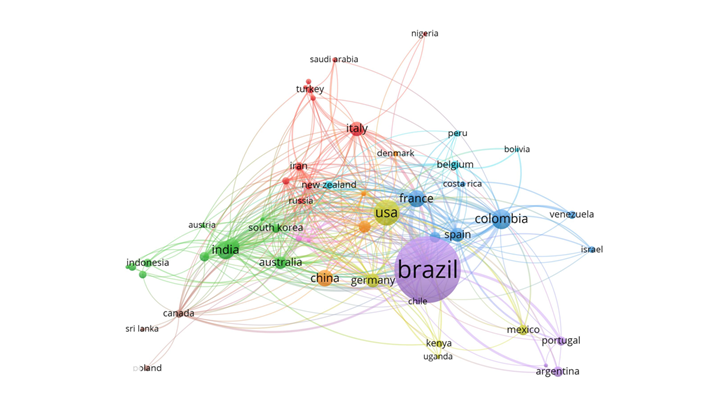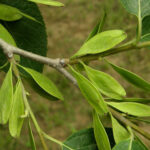Maria Luiza De Grandi, journalist, Ciência Rural, Santa Maria, RS, Brazil
Caroline Turazi, Researcher, Empresa Brasileira de Pesquisa Agropecuária (Embrapa), Brasília, DF, Brazil
The importance of passion fruit (Passiflora L.) in agribusiness is growing throughout the world. Passion fruit is a plant native to Brazil and generally sold for fresh consumption or for the pulp industry. Brazil has relevant bibliographical production and technological development on passion fruit for both the academic community and rural producers.
Researchers from Embrapa Cerrados in partnership with the University of Brasília (UnB) analyzed the co-authorship and co-citation network of scientific production related to Passion Fruit, the strength of connection between institutions and the map of co-occurrence of keywords between 2001 and 2020. The article Analysis of collaboration networks in scientific and technological research actions on passion fruit was published in the journal Ciência Rural (vol. 54, no. 1, 2024).
For studies related to co-citation and co-authorship, the Web of Science (WoS) database was used. Research networks on passion fruit were mapped considering teaching and research institutions, countries, year of publications and study themes. The evolution of research networks, published articles and filed patents was analyzed in four periods between 2001 and 2020.
Embrapa’s bibliographic production data were extracted from the Embrapa Agricultural Research Database (BDPA) and the technological production of Embrapa was extracted from the corporate asset management system. Technological monitoring was carried out in the database maintained by the European patent office Espacenet.
The research results showed that the Brazilian institutions in a prominent position in the analysis of co-authorship networks and that produced the largest number of publications involve Embrapa, the University of São Paulo (USP), the Federal University of Viçosa (UFV), the State University of Campinas (Unicamp), and the São Paulo State University (Unesp), which are the institutions that have done the most research on passion fruit in the world.
The study also demonstrated that there was an increase in the number of research on the genus Passiflora based on the production of technical and scientific publications in the last 20 years; every five years the number increased by more than 50%. The main topics studied were adsorption, antioxidants, clarification, evolution, flavonoids, flowering, growth and somatic embryogenesis, and Brazil, the United States, Colombia, India and France are the countries that most acted in networks on the subject of passion fruit.
According to Caroline Turazi, there’s also been an increase in the number of research institutions making up the thematic network of the Passiflora genus–in the last 20 years; every five years the number has increased by more than 50%. “Based on patents filed worldwide, it was possible to identify that there are both gaps and research opportunities, especially related to cosmetics, food, beverages and medicines,” points out the researcher.
According to Caroline, the research points to new paths for science related to research on passion fruit. “Bibliometric analyzes portray advances in knowledge and provide a perspective of research networks, being considered assessment tools in different thematic areas, in addition to serving as a basis for those interested in knowing the trends, histories, subjects and geographic distribution of specific themes. The results support decision-making in directing new research and characterize the organization of international collaboration networks,” concludes the researcher.
To read the article, access
TURAZI, C.M.V., et al. Analysis of collaboration networks for scientific and technological research on passion Fruit. Cienc. Rural [online]. 2024, vol. 54, no. 1, e20220443 [viewed 21 January 2025]. https://doi.org/10.1590/0103-8478cr20220443. Available from: https://www.scielo.br/j/cr/a/RBSxpG97tKb9RvVCPxJ7VSP/
External links
Ciência Rural – Social Media: Twitter | Facebook | Instagram
Como citar este post [ISO 690/2010]:




















Recent Comments